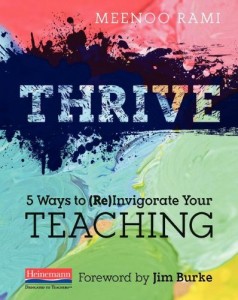Don’t Just Survive – Thrive in the Classroom

The book was dog-eared and the binding had been taped more than a few times. Whole passages were highlighted in faded ink. The book had clearly been used. The professor let me look at it and then took it back, advising me: “Get your own copy and read it every summer before school starts.”
I did.
Or least, I read the Wongs’ book for the first five years of teaching, absorbing the practical advice on how to help build a classroom community right from the first smile on the first morning of the first day, and then read on about how to tackle the tricky elements of classroom management.
I have since passed on the book to a paraprofessional who worked in my classroom during a difficult time. He went on to become a classroom teacher himself. Given all the effort he contributed that year, I felt the least I could do was pass on some of the knowledge that I had been given by my professor and the Wongs.
Stepping out into the connected world

Rami then goes on to outline the many ways that teachers can avoid the feeling of isolation by tapping into national and local networks, online communities, social media hangouts, and the spaces where one teaches. Teachers should also consider blogging, journaling, participating in edcamps, and engaging in other activities that promote consistent reflective practice.
Rami knows what she is talking about, too, as she is a presenter at national conferences, a teacher leader at Philadelphia’s innovative Science Leadership Academy, and voluntarily organizes the weekly #engchat on Twitter that is one of the more robust conversations about teaching you will find in social media space.
We are in charge of our learning
Thrive moves way beyond the nuts-and-bolts of The First Days of School by reminding all teachers, new and veteran, that we have an obligation to remain engaged in learning for ourselves – to accept the ownership and responsibility for our professional growth, just as we encourage our students to take charge of their own learning. Rami outlines, step-by-step, just how we can do that.
The book features small profiles of many teachers, chatting up their experiences of success and frustration and the shared power that comes from creating connections with many others who share our passions and commitments. Empowerment emerges as the anchor in Rami’s book, with students as the focal point.
“Our work as teachers is akin to the work of architects. While we may not build physical structures that we can visit and admire, I would argue that our legacy lasts longer in the ways our students will change the world.” — Rami (p. 75)
Reach out and contribute
The practice of reaching out for support and help, and of being there for other teachers who are doing the same, is energizing and affirming on many levels, and it’s one that I try to engage in as both a giver and a taker.
In these summer months between school years, it is helpful to be reminded that many networks exist for teachers to tap into. It is also helpful to be reminded, as she does in Thrive, that we need to seek out a variety of communities where we can make contributions.

Meenoo Rami
Rami tells her own stories of how she nervously connected with acclaimed teachers like Jim Burke, and gained confidence as she pursued connections with members of the business communities of Philadelphia. This outreach is something that both new and veteran teachers should be doing in an effort to grow — and yes, thrive — as educators who are always searching for ways to improve our practice.
Rami also provides an honest accounting of where she struggled in the classroom and how she picked up the pieces and moved her teaching practice forward, often with the help of others. Through this kind of sharing – this transparency – she paves a way forward for all of us.
Meenoo Rami’s core message really resonates. When we, the teachers, thrive in our own profession, then our students will thrive as learners. If student engagement isn’t a central daily goal of every teacher in every classroom, and every educator in every school, then it might be time for some to find a new profession.
For certain, it’s a good time to put a copy of Thrive into the hands of that teacher who is struggling or just starting out and help them on their way. Be a part of the solution.


































